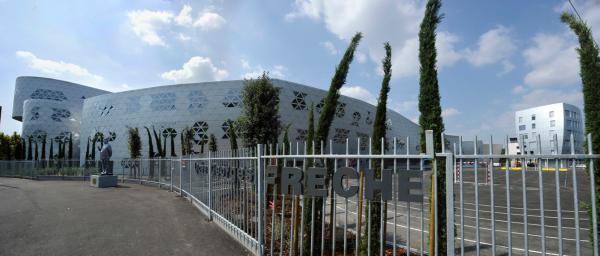
The European Investment Bank (EIB) has signed a loan agreement with the Languedoc-Roussillon Region to enable it to build and refurbish secondary schools to a high energy efficiency standard, meeting Europe 2020[1] environmental norms. A first EUR 100 million instalment was put in place on 7 September 2012 by the President of the Languedoc-Roussillon Region, Christian Bourquin, and EIB Vice-President Philippe de Fontaine Vive. The agreement was signed at the Georges Frêche Secondary School in Montpellier, the first of the five[2] new schools to benefit from this loan. The EIB’s overall contribution to this project will ultimately be EUR 400 million.
The programme financed by this substantial loan is aimed at raising the environmental standards and improving the energy efficiency of the region’s public and private schools. It comprises the construction of five new schools, including a low energy consumption pilot school, and the refurbishment of a further 43, but also the installation of wood-fired boilers. Fully in line with the goals of Europe 2020, the energy performance component will be enhanced with a renewable energies component consisting of the aforementioned wood-fired boilers and the installation of solar panels on the schools’ roofs.
At a time of a contracting credit in the markets, a major plus point of this operation is that it will provide the Languedoc-Roussillon Region with a long-maturity loan on favourable financial terms thanks to the EIB’s AAA rating. In line with the conditions applying when the contract was signed, the Region will be able to draw down the first instalment of €100 million for thirty years at very low rates.
At the signing ceremony, EIB Vice-President Philippe de Fontaine Vive said: “The enduring partnership between the EIB and the Region goes back to the early years of this century. I am delighted that the EIB is accompanying the Languedoc-Roussillon Region even further with this first direct loan, a mere year after the arrangement of a joint renewable energies facility. The modernisation of schools is key to economic, social and human development. And it is our duty to create the optimum conditions for fostering knowledge and learning. In so doing, we are preparing the future of the region’s young citizens of Europe.”
Christian Bourquin stressed that “the Region is in a position to enter into contracts with the EIB because it invests strongly in schools and youth in general. At the same time, this partnership with the EIB also represents an endorsement of the Region’s good financial health and especially its ability to finance its investments in a balanced way through savings and borrowings”.
This latest EIB loan to Languedoc-Roussillon demonstrates Europe’s commitment to underpinning the Region’s climate action. In 2011, the EIB provided a EUR 200 million loan to foster photovoltaic energy generation in a further show of the EIB’s support for France’s local and regional authorities, which since January 2012 has leveraged from its financial partners nearly €6 billion worth of investment in the country.
[1] The aim of the “Europe 2020” environmental strategy is to reduce greenhouse gas emissions by at least 20%, raise the proportion of renewables in final energy consumption to 20%, and increase energy efficiency by 20%.


